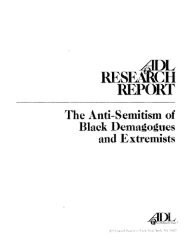You also want an ePaper? Increase the reach of your titles
YUMPU automatically turns print PDFs into web optimized ePapers that Google loves.
"<br />
o<br />
Page4of9<br />
should "maintain good-relations with the coalition forces" but afthe same time create "a secret group<br />
that would conduct attacks against American troops." U.S. analysts could not confirm that the ruling was<br />
issued by Iranian clerics, but they believe it was credible. Wrote one analyst: "It seems that they [the<br />
Iranians] want them [Iraqi Shiite supporters] to be close to the coalition forces and outwardly respect<br />
them so that they can gather Intelligence that will assist them in their mission."<br />
Before long, Iran's Ministry of Intelligence and Security stepped up Its Intelligence operations In Iraq,<br />
many of the Intelligence reports suggest. Agents set up "significant" Intelligence cells In key Iraqi cities,<br />
several reports said, Including Baghdad, Najaf, Karbala, Kut, Basra, and Klrkuk. MOIS agents also.set up<br />
a "listening post" In a city In southeastern Iraq to monitor the activities of U.S. forces. In southern Iraq,<br />
10 Iranian agents reportedly began operating out of two rooms at a Shiite mosque. Iran, according to<br />
the reports, also sought to place spies within Bremer's Coalition Provisional Authority, then running Iraq's<br />
affairs, and they followed and photographed coalition forces. Four Iranians, believed to be MOIS agents,<br />
were detained In late July 2003 for photographing a hydropower plant near the central city of Samarra.<br />
Power plants became a frequent target of insurgents. In one case, U.S. Intelligence officials learned that<br />
a MOIS agent, a man named Muhammad Farhaadl, videotaped coalition operations In Karbala, a city<br />
south of Baghdad, then took the tape 'back to Iran.<br />
During the summer and fall of 2003, U.S. analysts' reports describe how MOIS and Its operatives sought<br />
to develop information from ShIItes In the south and from Sunnls in the north on the activities of U.S.-led<br />
forces. In the fall of 2003, an analyst for the Air Force Office of Special Investigations wrote: "Iranian<br />
intelligence has infiltrated all areas of Iraq, posing both a tactical and strategic threat to U~S. Interests."<br />
Bribes and border crossings. MOIS also sought to cultivate former Iraqi Intelligence officers who might<br />
help develop Intelligence on the plans and activities of the Coalition Provisional Authority and U.S.-led<br />
forces, several reports said. "Former lIS [Iraqi Intelligence Servlce]offlcers are highly sought-after<br />
targets by U.S. intelligence," said an October 2003 report issued by the Air Force Office of Special<br />
Investigations, "not only for their current and former knowledge of Iraqi activities but also because many<br />
US officers will likely have a wealth of Intelligence information on Iran. Iran knows this and will striveto<br />
recruit former ns officers before the U.s. Is able to do so. The environment is ripe for double-agent<br />
operations, and loyalties can never be certain. n<br />
The Intelligence reports detail precisely what Iran was after. Its "collection priorities" included finding out<br />
what weapons U.S. troops were carrying and what kind of body armor they were wearing. Iranian agents<br />
also sought Information on the location of U.s. Army and intelligence bases; on the routes travel.ed by<br />
U.S. convoys; on the operations of the Special Forces' elite Delta Force; and on the plans of the U.S.<br />
military and Intelligence Inside Iraq. A military report said a source had reported that the Iranians were<br />
pressing to find out whether the Israeli Intelligence agency, Mossad, was active In Iraq. According to the<br />
report, MOIS directed its agents "to collect Information on the Israeli Intelligence presence In northern<br />
Iraq." Iran's "primary objective In Iraq," wrote another analyst, citing a good source, "Is to create<br />
Instability so coalition forces will focus on controlling the unstable situation rather than concentrating on<br />
reconstruction efforts."<br />
MOIS agents carried cash, reports said, to bribe Iraqi border pollee In order to obtain safe passage Into<br />
Iraq. In reality, however, all the IranJans had to do was walk across the border at any number of<br />
crossing points, where they could blend In amid Iranians coming to Iraq to visit relatives, do business,<br />
and worship at ShIIte shrines, according to the Intelligence reports and several senior Army officers<br />
Interviewed by U.S. News. "The borders were wide open," says one senior officer. "It suggests that<br />
terrorists could come over pretty easily. My God, there were busloads of Iranians crossing· the border<br />
without Interference." Another U.S. Army officer was so concerned that Iranian spies and Islamic<br />
jlhadlsts were crossing Into Iraq that he visited a border site in a mountainous region northeast of<br />
Baghdad last January. "I saw over 1,200 people come over [to Iraq] In an hour, and there were no<br />
[coalition] troops there," the officer recalls. "I did not see them armed, but then a lot of them came<br />
across in carts and some In vehicles and donkeys, and you wouldn't know. Ifonly 1 percent of them<br />
were combatants," he adds, "you can see the problem."<br />
Iranian agents f.1ad plenty of help waiting Inside Iraq. Numerous Intelligence reports say that members of<br />
a ShIIte militia group In Iraq known as the Badr Corps aided Iran In moving agents, weapons, and other<br />
materiel Into southern Iraq--sometlmes under the cover of humanitarian organizations. The Badr Corps<br />
has served as the armed wing of one of the most popular Shiite political parties In southern Iraq, the<br />
Supreme Council for Islamic Revolution in Iraq, or SCIRI. The leaders of both SCIRI and the Badr Corps,<br />
which now calls Itself the Badr Organization, have maintained close ties to Iran for about two decades.<br />
file:/IC:\Do.CUME-l\agb~kram\LOGALS-l\Temp\Cl 06ZFQF .~!m "1 1116/2004




